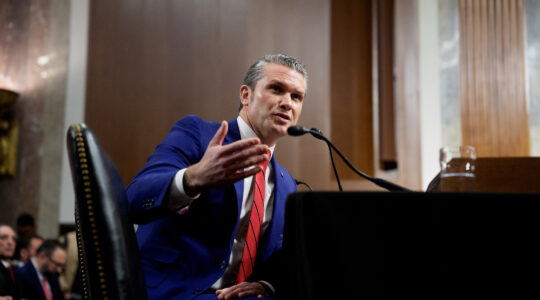WASHINGTON (JTA) – Supporters of a proposed congressional resolution recognizing the Armenian genocide say it is needed to clear up the historical record. But some observers say it is too positive in its portrayal of America’s response to the killings.
Critics, say that the nonbinding resolution introduced by U.S. Rep. Adam Schiff (D-Calif.) also obfuscates to a degree – by calling on the president to “recall the proud history of United States intervention in opposition to the Armenian Genocide.”
Historians, Jewish leaders and Armenian Americans who deal with the genocide say the U.S. role at the time was not a matter for pride, noting that America did not intervene militarily to stop the killings.
“We fell short then, just as we fell short during the Holocaust, during Cambodia, in Rwanda and even today in Darfur,” said Aram Hamparian, executive director of the Armenian National Committee of America in Washington.
Schiff, whose Pasadena area constituency boasts a substantial Armenian population, has garnered the co-sponsorship of a majority of his colleagues in the U.S. House of Representatives, including most of the Jewish lawmakers.
In an interview with JTA, Schiff said he had never heard any complaints suggesting it whitewashed America’s role.
“I’m open to re-examining the word intervention if it’s too strong a word,” Schiff said.
The congressman said the line in question is meant to recall the lead role played by U.S. officials in drawing attention to the killings and the massive amount of money raised from ordinary Americans to help Armenian refugees.
“We don’t mean to suggest some sort of military intervention took place or that more could not have been done,” Schiff said.
Turkey is lobbying hard against the resolution, saying the massacres at the time were the product of hostilities by both sides.
It was a prominent American Jew, the philanthropist turned diplomat Henry Morgenthau, who helped bring the genocide to light. Morgenthau, then the Wilson administration’s envoy to the Ottoman Empire, urged his superiors to act, describing the massacres as “a campaign of race extermination.”
As many as 1.5 million Armenians died in the massacres. Morgenthau’s post-World War I book, “Ambassador Morgenthau’s Story,” is one of the first to chronicle the slaughter.
Yet Morgenthau was unable to prod his government into military intervention; the United States entered the war in 1917, after the genocide, and principally to protect its European allies, Britain and France.
Instead President Woodrow Wilson acted on a call by the U.S. Senate to urge Americans to donate to Armenian relief. Between 1916 and 1930, $116,000,000 – billions in today’s dollars – was raised, and 132,000 Armenian orphans were brought to the United States.
That was no little thing, Hamparian acknowledged. “It was a huge effort,” he said. “It saved my own grandmother.”
Still, the failure by the United States to stop the Armenian genocide should not be obscured, said Rabbi David Saperstein, who heads the Reform movement’s Religious Action Center.
“Candidly and honestly assessing our own successes and failures in confronting past genocidal activity can constructively inform how we deal with genocidal activity in our own time,” said Saperstein, whose movement is at the forefront of raising awareness about Darfur, where Sudan government-allied militias have slaughtered hundreds of thousands of civilians.
“The controversy over this informs contemporary political realities, because the lesson of such controversies is that if nations can get away with obscuring the dark moments of their past, then it encourages others,” he said.
JTA has documented Jewish history in real-time for over a century. Keep our journalism strong by joining us in supporting independent, award-winning reporting.





